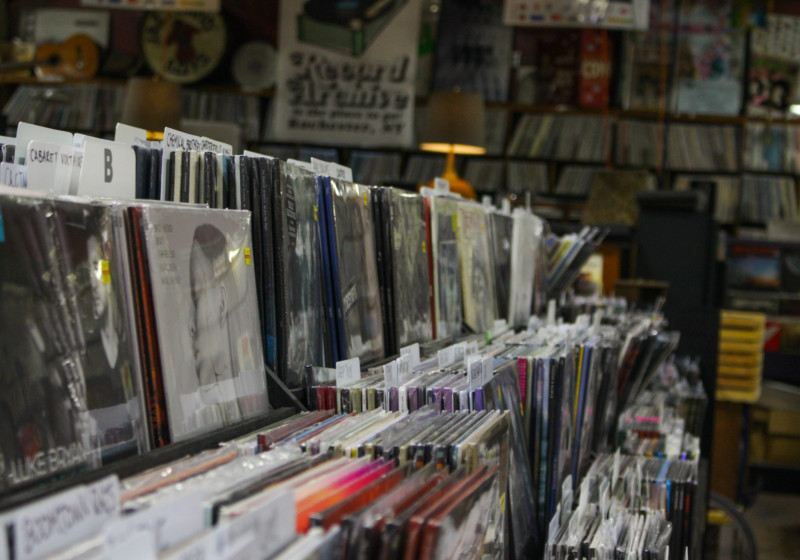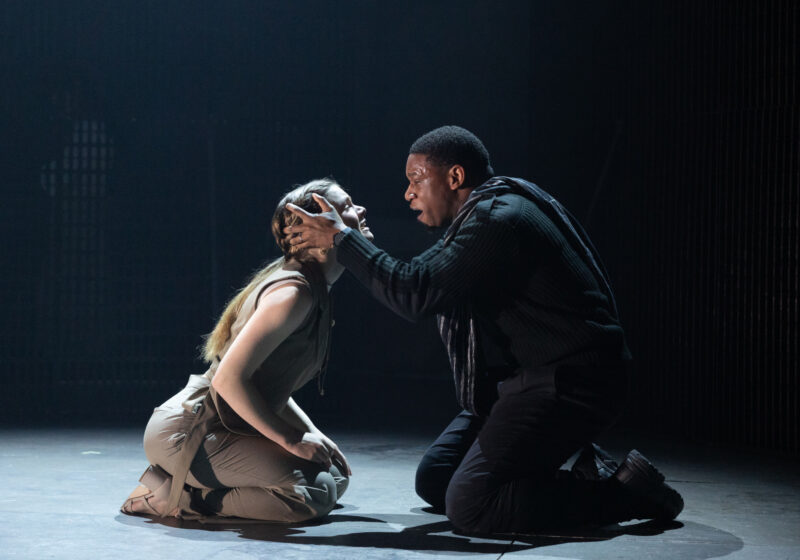Vinyl record sales might be at their highest peak since the early ‘90s, but physical copies only account for about 7 percent of those sales. Unsurprisingly, record stores — including Rochester’s — have been feeling the sting of this. But they’re still here. And they’re waiting for you to come find them.
One of the oldest and largest record stores in town is Record Archive. The store began as two separate locations, one in what is now College Town and another on East Ave. The two stores combined into one in 2008 at what is Record Archive’s current and larger-than-ever location on Rockwood Street.
Record Archive’s co-owner Alayna Alderman has been with the store since the beginning, bearing witness to the many changes a record store needs to make to stay in demand in the constantly fluctuating music market. What sets Record Archive apart more than anything is its sheer size and diverse ways of pulling in profit.
“For us, size is important and always has been, since we carry so many different configurations of music entertainment, and because of the depth and breadth of our catalog […] It’s really the catalog that has sustained us,” Alderman said.
As of recently, Alderman worked to expand the store to include a bar and lounge area that hosts live music weekly.
“The most interesting adaptation is that we are now the very first record store in New York state to have our beer and wine license full-time,” she said, adding, “My concept here has to be a record store that now offers beer and wine as another line item, not a bar that sells music.”
But even their smart expansion, ability to adapt, and large catalog wouldn’t be enough to keep Record Archive afloat were it not for its patrons — the bands and listeners that make up the Rochester music community.
“We have a very cool tight-knit music community,” Alderman said. “Everyone knows each other, every band goes out and supports other bands.”
The Record Archive does not simply benefit from the community, but instead exists as a “music oasis, […] a hangout, a community touchstone,” in Alderman’s words.
A tight-knit community is not always a bulletproof one, however, and the antisocial nature of music streaming’s accessibility and convenience has reduced how much people seek out their local and tangible music community. This is seen not just in the struggles that record store’s have faced, but in other areas such as music journalism as well.
“We had a great music critic on staff until a local newspaper made a huge error of letting him go and now there’s literally no local voice to speak on behalf of the entertainment community,” Alderman said.
There are other, smaller players that play a different role in Rochester.
In South Wedge, we have NeedleDrop Records, the exact opposite of Record Archive in terms of size and name-recognition. Located across from the German House and built out of blue-painted brick, NeedleDrop is an independent store advertised to specialize in “punk, indie, hardcore, metal, experimental, and noise.”
Underground specialty record stores were always a rarity, and with the modern dominance of digital music consumption, their rarity only becomes more notable.
In addition to music, NeedleDrop also sells audio equipment and magazines, some of which are locally and independently produced. Current owner and former bassist of Rochester punk band Obsessor, Russ Torregiano owes his success to local musicians and music fans, saying that if “they weren’t a part of it, I wouldn’t be here.”
He believes that the public should stand with music stores, “because we’ve been starting to lose them again.”
“Like, we lost Lakeshore Records, two huge stores in Buffalo just closed,” Torregiano said. “I’m getting phone calls and talking to different, big record labels and they’re all, ‘Hey, how are things going?’ and you know, you’re like, ‘It’s not what it was five years ago,’ but even they’re saying, ‘yeah our sales our down too,’ and these are big labels.”
Stores have been struggling. And that’s why Torregiano asks that you support record stores “because without them, it’ll leave a glaring hole within Rochester.” It already is.
Lakeshore Record Exchange was a Park Ave fixture, located on the same street as Krudco Skateshop, the oldest skate shop in New York and another emblem of Rochester counterculture. Andrew Chinnici purchased the store from previous owner Ron Stein in 1988, eventually moving the store from its original location in Brighton to Park Ave in 2000.
Lakeshore was a center for alternative music in bulk, its walls lined with CDs and records, bestselling and neighborhood favorites, European and domestic. This August, it celebrated its 29th year in business. In September, it closed its doors for the last time.
In a public statement, Chinnici described the store’s shutting down as a “natural conclusion,” its “purpose for being” eliminated by “the new ways in which people consume music,” “time and technology.”
Chinnici plans to maintain a presence in the Rochester music community through the Alternative Music Film Society, which screens music documentaries at the Memorial Art Gallery, and through the Alternative Music online radio, both of which Chinnici is president of.
To many, there’s something particularly sad about the closing of a record store. You lose a community space, an exciting relationship between you and tangible music. In Rochester, these places are integral to underlooked art and culture, which only intensifies the loss.
All these stores rely on patronage above all in order to keep doing what they do. People are quick to decry the loss of music stores and communities, but this is often too little too late.






